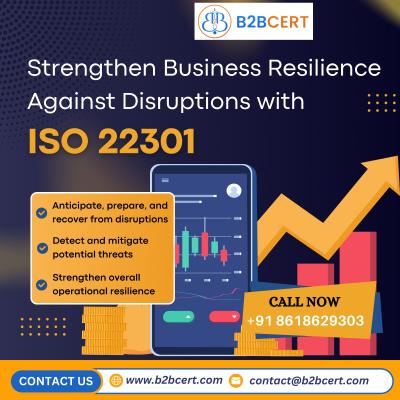What is the Difference Between Certification and Self-Declarati
-
In today’s competitive business environment, organizations are expected to demonstrate their commitment to quality, compliance, and best practices. Whether it’s about ensuring business continuity, information security, or safety, companies are often required to show proof that they meet international standards such as ISO. Two common ways to achieve this are through certification and self-declaration of compliance. While both serve as methods to demonstrate conformity, they differ significantly in terms of process, credibility, and acceptance.
For businesses in Bangalore aiming to strengthen resilience and continuity management, understanding the difference between certification and self-declaration of compliance is especially relevant when considering ISO 22301 Certification in Bangalore. Let’s explore these two approaches in detail.
Understanding Certification
Certification is a formal, third-party recognition that an organization complies with a particular standard. In the case of ISO standards, certification is conducted by accredited certification bodies. For instance, an organization seeking ISO 22301 Certification in Bangalore must undergo an audit carried out by an independent, accredited body to ensure it meets the requirements of ISO 22301 – the international standard for Business Continuity Management Systems (BCMS).
Key Characteristics of Certification:
-
Independent Verification:
Certification is carried out by an external body, providing impartial and credible validation. -
Formal Recognition:
Organizations receive a certificate that serves as tangible proof of compliance, enhancing their reputation in the marketplace. -
Customer Confidence:
Certification reassures stakeholders, clients, and regulatory authorities that the organization has met recognized standards. -
Regular Audits:
Certification requires surveillance audits (typically annually) and recertification audits every three years to maintain validity. -
Global Acceptance:
Certified organizations enjoy international recognition, which can give them a competitive edge in global markets.
For businesses, especially those operating in risk-sensitive industries like IT, banking, or healthcare, certification offers credibility that self-declaration often cannot match.
Understanding Self-Declaration of Compliance
Self-declaration of compliance is when an organization declares on its own that it meets the requirements of a specific standard, without undergoing third-party verification. In this approach, the responsibility lies entirely with the organization to implement, monitor, and maintain compliance with the chosen standard.
Key Characteristics of Self-Declaration:
-
Internal Verification:
The organization itself assesses its conformity to the standard without external audits. -
Cost-Effective:
Since it does not involve certification bodies, self-declaration is cheaper and quicker to implement. -
Limited Recognition:
While self-declaration may satisfy internal needs or certain stakeholders, it often lacks the universal credibility associated with certification. -
Greater Flexibility:
Organizations have more control over the process and timelines, as they are not bound by external audits. -
Higher Risk of Questioning:
Customers, regulators, and partners may question the authenticity of a self-declaration since it lacks independent validation.
Self-declaration can be useful for small businesses or internal compliance management, but for larger organizations dealing with global clients or critical industries, it may not be sufficient.
Why Certification is More Valuable
While self-declaration is a valid approach in certain cases, certification provides far greater value for organizations aiming for long-term success and credibility. Certification demonstrates to external stakeholders that compliance is not just a claim but has been validated through rigorous, impartial processes.
For example, in the context of ISO 22301 Certification in Bangalore, businesses that are certified can showcase their resilience and readiness to continue operations during disruptions. Clients, regulators, and investors see this as a mark of trust and reliability. On the other hand, self-declaration may not hold the same weight, especially in contracts or regulatory environments that mandate certification.
Role of ISO 22301 Consultants in Bangalore
Navigating the path to certification can be complex. This is where professional guidance from ISO 22301 Consultants in Bangalore becomes crucial. Consultants help organizations by:
-
Conducting gap analysis to identify areas of non-conformity.
-
Designing and implementing Business Continuity Management Systems (BCMS).
-
Preparing documentation and records required for certification audits.
-
Training employees on compliance practices and responsibilities.
-
Coordinating with certification bodies to ensure smooth audits.
By leveraging expert ISO 22301 Services in Bangalore, organizations can save time, reduce risks of audit failures, and achieve certification faster.
When is Self-Declaration Suitable?
Self-declaration might be suitable in the following scenarios:
-
Internal Compliance: When the aim is to align internal processes with standards without external recognition.
-
Early Stages: For startups or small businesses preparing for certification in the future but lacking resources at the moment.
-
Low-Risk Industries: Where customer or regulatory requirements do not demand third-party certification.
However, organizations should clearly communicate the scope of self-declaration and avoid presenting it as equivalent to certification, to maintain transparency with stakeholders.
Conclusion
The main difference between certification and self-declaration of compliance lies in credibility and recognition. Certification involves third-party verification, ensuring higher stakeholder trust and global acceptance, while self-declaration is self-driven, cost-effective, but limited in credibility.
For organizations in Bangalore looking to build resilience and business continuity, pursuing ISO 22301 Certification in Bangalore is a strategic investment. With the support of experienced ISO 22301 Consultants in Bangalore and tailored ISO 22301 Services in Bangalore, businesses can achieve certification smoothly and strengthen their reputation in both local and international markets.
-
